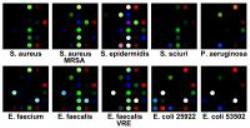A fast and simple technique to detect infectious bacteria has been devised by researchers at the University of Illinois. The study was headed by chemistry professor, Ken Suslick.
The presence of bacteria is detected by combining a group of printed pigments that function as a chemical sensor. The results of the research were published in the Journal of the American Chemical Society.
 Sensor Array
Sensor Array
Suslick has designed an artificial "nose", consisting of an array of 36 cross-reactive pigments, to locate hazardous substances such as explosives, toxins and poisonous gases in the air. The pigment dots change color when they detect chemicals in the air.
First, blood samples are placed on Petri dishes and a sensor array is fixed within the lid of all dishes. The dishes are then placed upside down on a standard flatbed scanner. Researchers scan the arrays every half-an-hour to monitor the pattern of color change in the dots that stand for a particular type of bacteria.
Suslick stated that clinical blood culturing, which takes three days to diagnosis the problem, is a time-consuming process and delayed diagnosis could prove fatal for patients.
Source: http://illinois.edu/